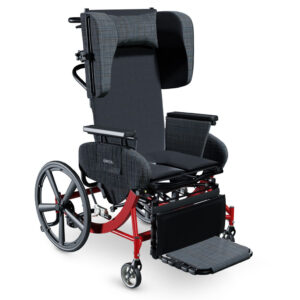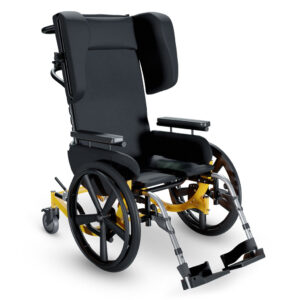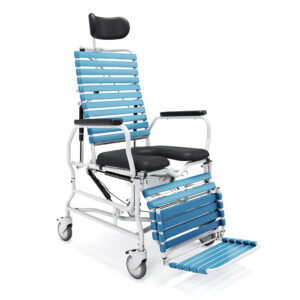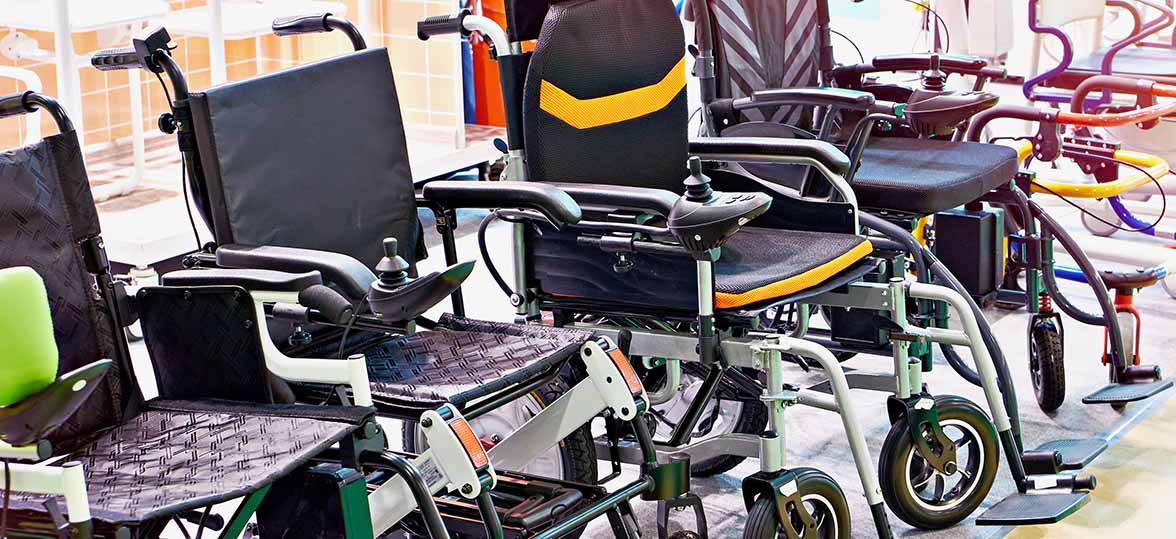Parkinson’s disease (PD) causes considerable challenges with movement and mobility. According to studies, people with a diagnosis of Parkinson’s disease experience an increased fall risk. Approximately 45% to 68% of people with PD will fall each year.1 This is due in part to the difficulties with balance and impaired sensation that are common with Parkinson’s.
One solution to help those living with Parkinson’s disease maintain their mobility and independence is the use of a Broda wheelchair. Broda wheelchairs are ideal as chairs for people with Parkinson’s disease because they offer stability and injury prevention, both key considerations for those with Parkinson’s.
Broda wheelchairs can be configured with a number of features that make them ideal for those with Parkinson’s, including:
- A low seat to floor height which enables self-propulsion and lowers the risk of falls
- Padded armrests which provide comfort and stability
- Brakes that can be easily accessed and operated
- Tilt and recline functionality that can redistribute pressure, increase seating stability, and help keep the user comfortable.
Recommended Wheelchairs for Parkinson’s Patients
Essentials of a Parkinson’s Wheelchair
Compatible with a Fall Prevention Plan
A person with Parkinson’s could fall for a variety of reasons, such as tremors, poor balance, improperly executed transfers, wheelchair malfunctions, and excessive fidgeting from discomfort. At Broda, we engineer solutions to make seating safe and comfortable for every part of your routine, including medical wheelchairs and shower chairs that are suitable for daily use.
Bathing can be especially risky for people with Parkinson’s who are using a low-quality shower chair. Our Revive Shower Commode is a preferred shower chair for Parkinson’s patients because it offers:
- Multiple adjustable seating features, including moveable arm and leg supports, seat tilt, and a fully reclining back
- Supportive Comfort Tension Seating®
- Durable and sanitizable chair materials, including a removable seat and bed pan
Encourages and Enables “No-Lift” Fall Prevention
Broda wheelchairs include built-in fall prevention features that work in tandem with any “no-lift” or fall prevention program. Our swing-away arm and leg supports can pivot to the side. Caregivers can even remove these accessories to make room to transfer the patient to and from the wheelchair. During use, our wheelchairs can tilt and recline to help the occupant keep a comfortable and secure posture.
In a full, 90-degree reclining position, a user can transfer from their bed to their wheelchair on a slide board, without being lifted at all.
Reliable Comfort That Prevents Falls
For any person who uses a wheelchair daily, comfort plays a significant role in their risk of falling. An uncomfortable patient is more likely to scoot towards the edge of the wheelchair. This changes the center of gravity for both the patient and the wheelchair, putting the patient at risk for injury.
For a person with Parkinson’s, repositioning themselves in a wheelchair brings greater risk of fall. Their tremors and balance issues make it much harder for them to make sudden, fall-preventing corrections, so it’s imperative that they feel comfortable and at rest in the chair they use daily. Broda’s one-of-a-kind Comfort Tension Seating® system provides that level of comfort. Unlike conventional sling-style wheelchairs, Comfort Tension Seating® consists of individual straps that mold to the user’s body, creating a uniquely supportive seating surface.
Wheelchairs for Parkinson’s Patients That Support Safe Daily Living
A Broda wheelchair is an excellent seating solution for Parkinson’s disease. To speak with a Broda representative about wheelchairs for you, your loved one, or your patient, just reach out.
Frequently Asked Questions
What stage of Parkinson’s creates difficulty walking?
Parkinson’s disease progresses through five stages, beginning with mild symptoms and gradually impacting mobility. Walking difficulties typically emerge in Stage 3, when balance issues and slowed movement increase the risk of falls. By Stages 4 and 5, individuals often require mobility aids or full-time assistance as walking becomes extremely difficult or impossible.
Can Parkinson’s disease cause dizziness?
Yes, Parkinson’s disease can cause dizziness or lightheadedness, often due to low blood pressure (orthostatic hypotension), medication side effects, or autonomic nervous system dysfunction. This can increase fall risk, making stable seating and careful movement transitions essential for safety.
What is the difference between Alzheimer’s and Parkinson’s disease?
While both are neurodegenerative diseases, Alzheimer’s primarily affects memory and cognitive function, while Parkinson’s primarily impacts movement and motor control. Parkinson’s symptoms include tremors, stiffness, and balance issues, while Alzheimer’s leads to progressive memory loss and confusion. In later stages, both conditions can cause mobility challenges, but they progress differently.
How can Broda wheelchairs improve comfort and mobility for someone with advanced Parkinson’s?
Broda wheelchairs enhance comfort and mobility for individuals with advanced Parkinson’s by providing tilt-in-space positioning, padded armrests, and a low seat-to-floor height for stability. The Comfort Tension Seating® system molds to the user’s body, reducing pressure points and the urge to fidget, which can lead to falls. These features promote secure, comfortable seating and ease of movement, improving overall quality of life.
References
- Pelicioni, P. H. S., Menant, J. C., Latt, M. D., & Lord, S. R. (2019). Falls in Parkinson’s Disease Subtypes: Risk Factors, Locations and Circumstances. International Journal of Environmental Research and Public Health, 16(12), 2216. https://doi.org/10.3390/ijerph16122216






